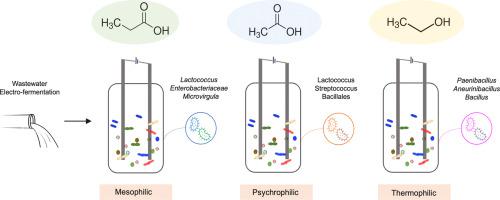Resources, Conservation and Recycling ( IF 11.2 ) Pub Date : 2024-01-20 , DOI: 10.1016/j.resconrec.2024.107407
Sidan Lu , Aaron Leininger , David Jassby , Eric M.V. Hoek , Harold D. May , Zhiyong Jason Ren

|
Temperature significantly influences fermentation, affecting microbial communities and metabolites. This study explored the impact of temperature on electrically regulated electro-fermentation, focusing on volatile fatty acid production at different temperatures (psychrophilic 10 °C, mesophilic 20 °C, and thermophilic 55 °C) under controlled anode potentials. Results showed that at 10 °C, propionic and valeric acid production increased, while at 20 °C, acetic and propionic acids were predominant. At 55 °C, more formic acid and ethanol were produced. The dominant microbial species varied with temperature: Lactococcus bacteria were prevalent in psychrophilic and mesophilic reactors, and thermophilic bacteria in the thermophilic reactors. Electrical potential had a minimal effect on acid products, but temperature significantly influenced them. Low temperatures favored propionic and valeric acid production, correlating with specific microbial abundance. Conversely, high temperatures led to increased formic acid and ethanol. These findings offer valuable insights for optimizing electro-fermentation systems and enhancing valuable fatty acid production.
中文翻译:

废水电发酵酸回收的温度依赖性
温度显着影响发酵,影响微生物群落和代谢物。本研究探讨了温度对电控电发酵的影响,重点关注受控阳极电位下不同温度(嗜冷 10 °C、嗜温 20 °C 和嗜热 55 °C)下挥发性脂肪酸的产生。结果表明,在 10 °C 时,丙酸和戊酸产量增加,而在 20 °C 时,乙酸和丙酸占主导地位。在55℃时,产生更多的甲酸和乙醇。主要微生物种类随温度变化:乳球菌在嗜冷和中温反应器中普遍存在,而嗜热细菌在嗜热反应器中普遍存在。电势对酸产物的影响很小,但温度对其影响很大。低温有利于丙酸和戊酸的产生,与特定的微生物丰度相关。相反,高温导致甲酸和乙醇增加。这些发现为优化电发酵系统和提高有价值的脂肪酸生产提供了宝贵的见解。

































 京公网安备 11010802027423号
京公网安备 11010802027423号